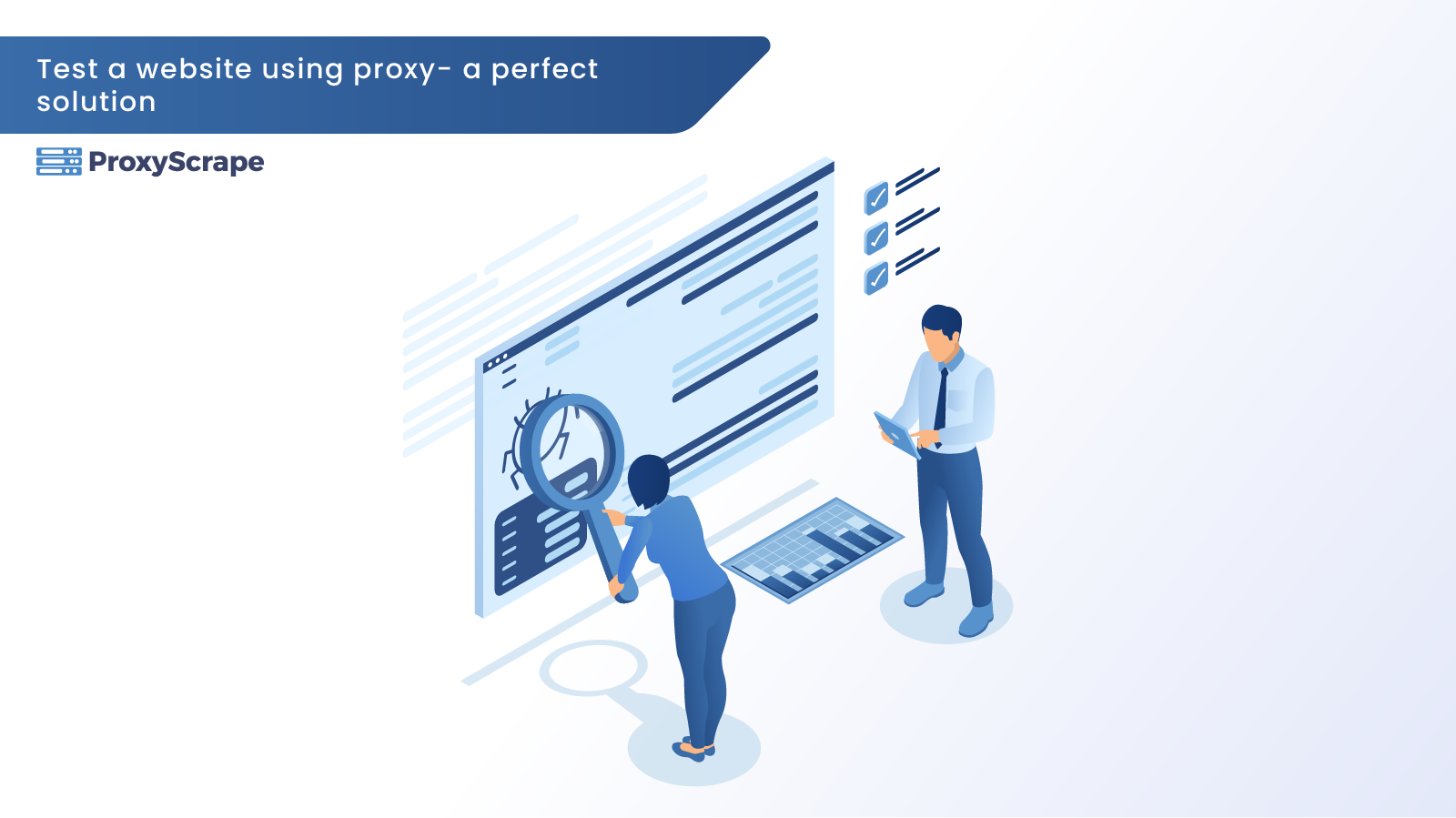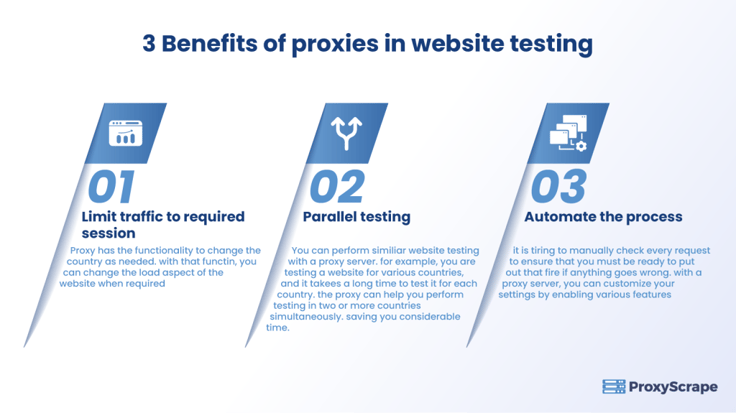
“Test a website using proxy“ Imagine a scenario where you and your teammates are building an eCommerce website for an important client. You want to make sure that everything is going according to plan. The development went according to plan, and now you want to test it out to ensure that everything, such as load
“Test a website using proxy“
Imagine a scenario where you and your teammates are building an eCommerce website for an important client. You want to make sure that everything is going according to plan. The development went according to plan, and now you want to test it out to ensure that everything, such as load, page optimization, and page speed, is appropriately working as intended. You check, and everything seems to be working correctly.
You deploy the website on the proper endpoint and monitor the traffic in real time. But, the data you get does not match the data you got during the testing session. What happened?
The main reason could be that you may not have considered that the eCommerce site is available to worldwide users, and you optimized it for your local region. When a website is deployed worldwide, the parameters differ. It will not remain the same as the local region. So, how do you test a website before deployment? The solution could be using a proxy server.
In the upcoming block, we will see how to test a website using a proxy and how a proxy server is an essential tool for every other online task.
Feel free to jump to any section to learn more about how to test a website using proxy server
How to Test A Website Using a Proxy?
Benefits of a Proxy Server in Website Testing:
Which Is the Best Proxy for Website Testing?
A Proxy Server – What Is It?
A proxy server is an intermediary server that sits between you (the client) and the target server (online).
Usually, when you connect to the Internet, you request the target server and ask permission to access contents with the help of your IP (Internet Protocol) address. Since your IP address is tied to your physical location, the target server gives access to its contents based on that information.
But what if you are trying to perform a task you cannot do in your region? The target server can block your IP address and obstruct your work. This is where a proxy server shines. Once you connect to a proxy network, you can “trick” the target server by saying that you are accessing content from the desired location.
Since your IP address is masked with the proxy’s IP address, accessing the content and performing various tasks are easier without getting an IP block from the target server.
How to Test A Website Using Proxy?
Web testing is the process of testing a website before you make it live and available to every user online. The primary purpose of a web testing process is to find any potential problems and bugs present in the source code and rectify them before deploying the website to a live environment.
During the web testing process, you will usually check for various factors, such as compatibility (for devices), security, and performance, such as page optimization, page load speed, and ability to handle sudden fluctuations of users on the website.
How do you test a website? The optimal way to test a website is to get data from an actual device used by a real user. You need a tool that helps you test the website remotely without downloading any software on your local device.
That tool is a proxy server. A proxy server allows you to access websites from different countries.
It is essential to understand that the proxies are pooled together in a network, meaning that you can get data quickly from other countries using respective servers.
Now you know how a proxy helps to access different servers to gather data about your website. The technical function of a proxy server that allows web testing is simple:
Imagine the same scenario: You are developing an eCommerce website for your client and checking for traffic flow to the website. You encounter a bug that affects the visitor’s login. You are tasked to perform a root cause analysis for the issue.
You first need to check if the data flows appropriately between your website’s front end (the UI side) and back end (programming script). Usually, a proxy server helps you capture HTTP traffic between the front and backend. Based on the streaming data, you can start to debug.
Also, with the help of a proxy, you can begin monitoring various aspects, such as the type of request, whether it was an HTTP request, response size, and response time. Such as this, you can perform various testing and make your code error-free.
Benefits of a Proxy Server in Website Testing:
The main benefit of a proxy server in website testing is, localizing the web testing process. Apart from that, there are other benefits that you can see in website testing, such as:

- Limit Traffic to Required Sessions – As you know, the proxy has the functionality to change the country as needed. With that function, you can change the load aspect of the website when required. For example, you might need more bandwidth during a sale like Black Friday and less bandwidth during regular days. This is very helpful in measuring how well your website performs in testing sessions during sudden fluctuations in traffic.
- Parallel Testing – You can perform similar website testing with a proxy server. For example, you are testing a website for various countries, and it takes a long time to test it for each country. The proxy can help you perform testing in two or more countries simultaneously, saving you considerable time.
- Automate the Process – It is tiring to manually check every request to ensure that you must be ready to put out that fire if anything goes wrong. With a proxy server, you can customize your settings by enabling features such as: Notifications if the website’s functionality is abnormal.Automation of regular tests at a fixed time to ensure that websites are functioning properly.Ability to show suitable ads to the right audience based on their preferences. Protect your revenue by encrypting the traffic between your frontend and backend data streaming.Maintain the overall health of your website by regularly checking for broken links and improving navigation and security factors.
- Notifications if the website’s functionality is abnormal.
- Automation of regular tests at a fixed time to ensure that websites are functioning properly.
- Ability to show suitable ads to the right audience based on their preferences.
- Protect your revenue by encrypting the traffic between your frontend and backend data streaming.
- Maintain the overall health of your website by regularly checking for broken links and improving navigation and security factors.
Which Is the Best Proxy for Website Testing?
ProxyScrape is one of the most popular and reliable proxy providers online. Three proxy services include dedicated datacentre proxy servers, residential proxy servers, and premium proxy servers. So, what is the best proxy in order to test a website using proxy? Before answering that questions, it is best to see the features of each proxy server.
A dedicated datacenter proxy is best suited for high-speed online tasks, such as streaming large amounts of data (in terms of size) from various servers for analysis purposes. It is one of the main reasons organizations choose dedicated proxies for transmitting large amounts of data in a short amount of time.
A dedicated datacenter proxy has several features, such as unlimited bandwidth and concurrent connections, dedicated HTTP proxies for easy communication, and IP authentication for more security. With 99.9% uptime, you can rest assured that the dedicated datacenter will always work during any session. Last but not least, ProxyScrape provides excellent customer service and will help you to resolve your issue within 24-48 business hours.
Next is a residential proxy. Residential is a go-to proxy for every general consumer. The main reason is that the IP address of a residential proxy resembles the IP address provided by ISP. This means getting permission from the target server to access its data will be easier than usual.
The other feature of ProxyScrape’s residential proxy is a rotating feature. A rotating proxy helps you avoid a permanent ban on your account because your residential proxy dynamically changes your IP address, making it difficult for the target server to check whether you are using a proxy or not.
Apart from that, the other features of a residential proxy are: unlimited bandwidth, along with concurrent connection, dedicated HTTP/s proxies, proxies at any time session because of 7 million plus proxies in the proxy pool, username and password authentication for more security, and last but not least, the ability to change the country server. You can select your desired server by appending the country code to the username authentication.
The last one is the premium proxy. Premium proxies are the same as dedicated datacenter proxies. The functionality remains the same. The main difference is accessibility. In premium proxies, the proxy list (the list that contains proxies) is made available to every user on ProxyScrape’s network. That is why premium proxies cost less than dedicated datacenter proxies.
So, what is the best solution to test a website using proxy? The answer would be “residential proxy.” The reason is simple. As said above, the residential proxy is a rotating proxy, meaning that your IP address would be dynamically changed over a period of time which can be helpful to trick the server by sending a lot of requests within a small time frame without getting an IP block.
Next, the best thing would be to change the proxy server based on the country. You have to append the country ISO_CODE at the end of the IP authentication or username and password authentication.
ProxyScrape provides excellent customer support, who can solve your issue 24-48 business hours after you complain.
FAQs:
FAQs:
1. Is the proxy server enough to perform web testing?
2. Which is the better proxy for your website testing?
3. Can we use a free proxy for website testing?
Conclusion:
A website is the face of your organization. If you are in the eCommerce business, you need to ensure that you have taken every measure and have tested every parameter possible to give the best user experience to your target audience. That is why web testing is a crucial part of the development cycle of your website. You need the best tools in your arsenal to perform web testing.
A proxy is a great companion to your web testing tool, with features such as the ability to change the country server to monitor how the website performs, limit your traffic and vice versa, and automate the whole testing process in order to save time. ProxyScrape provides an efficient and reliable proxy for web testing. This article hopes to give enough information on how to test a website using proxy server.